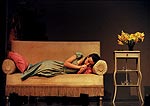Last May’s “Molière” ceremony confirmed the emergence of an exciting presence in French theater, when director Irina Brook’s production of Richard Kalinoski’s “Une bête sur la lune” won Best Repertory Play, Best Adaptation, Best Direction, Best Actor and Best Actress, sweeping France’s annual drama awards.
A tour de force for a relative newcomer to Paris theater, the event has placed Brook at the center of a world she has long observed, as the daughter of the director Peter Brook and the actress Natasha Parry. What sets Irina apart from many a director in France however is not her famous parents, but a rare gift for telling stories in a simple language drawing on dance and music that movingly explores life’s beauty and tragedy, and profoundly touches audiences. Brook turns her talents this month to Tennessee Williams’ “La Ménagerie de verre” (‘The Glass Menagerie”), a play that demands the kind of empathetic treatment of character for which America’s famously troubled playwright is best known and for which Brook is now making a name for herself.
If her production promises to be a highlight of the rentrée, one reason is the timeless tale of illusion and loss that infuses Williams’ first play and that offers an ideal vehicle for this young director’s vision. The other is the author’s stage notes that, as Brook told the Paris Voice, offered her “an invitation [she] couldn’t resist” to explore this most imagistic of Williams’ works. For his play about Laura Wingfield and the glass animals that are her shelter from life’s painful truths, the Saint Louis-raised writer imagined a highly expressionistic set created by non-naturalistic lighting, magic lantern slides and projected lines from the text. Brook answers Williams’ call to be creative with original music, choreography and video, while asking actress Romane Bohringer to create the fragile and ephemeral Laura.
Music and movement are defining aspects of Brook’s direction, from a whirling, jigging production of Brian Friel’s “Danser à Lughnasa” (1999) to a stylized reading of Katherine Burger’s “Résonances” (1999), where dance lent mystery and grace to four friends’ struggle to embrace life and love. So inventive was her direction that she won a Molière for Best New Female Talent in 2000. Nevertheless, it is the desire to tell stories that offer meaning, joy and most of all hope that, Brook explained, is at the core of her art.
“I do feel that it’s a kind of artistic desire to create [a show] that is trying to say something about the world that I live in or the way that I feel about life,” she said of her choice of works. “All the plays I’ve managed to get hold of up to now have had that mixture of humor and emotion, and I find that one without the other doesn’t really interest me that much. They’re kind of positive pieces and that is very important to me.”
With “La Ménagerie de verre” her fifth production in France and now two Molière’s under her belt, Brook’s career appears to be launched in the country she calls home. Yet, of the theater arts, directing was not her first choice — it took 15 years of acting in off-off-off Broadway and fringe theater in London for her to cross over to the other side of the footlights and to discover this was where she always wanted to be. Having “come late” to directing she explained, she now throws herself completely into her shows. “I feel much more aware of the preciousness of time,” she insisted. “I don’t feel I have any time or any emotional energy to waste. Therefore if I do something, I really want to do it entirely.”
The story of “Une bête sur la lune” (‘Beast On the Moon”) demonstrates the kind of investment she means. A London production in 1996 was Brook’s first show as a director. When, awaiting the birth of her son Prosper, she decided to move back to Paris in 1998, the piece came with her and played in French that same year with the original bilingual cast before being taken up by the Théâtre de l'Œuvre last season. If the show’s acclaimed seven-month run there is any proof, Brook’s years of hard work have paid off, but the director prefers to credit the performances of her actors, Simon Abkarian and Corrine Jaber, and Kalinoski's tale of Armenian refugees in Milwaukee in 1920. “It’s a play that just generates something exceptional everywhere it goes,” she remarked.
The same could be said of Brook’s direction, which reveals an artist fully in touch with her craft, her texts and her actors. Like the characters in the plays she chooses, Irina Brook is also looking to understand life’s voyage, but, in her case, through storytelling, a practice at which she excels. “It’s the fact of having characters [who are searching for meaning in life] that makes me interested,” she explained. “That there’s someone who is trying to understand what it’s all about makes me hooked. It makes me really want to tell that story.”
Meanwhile, Irina Brook is spinning her own magic as a fascinating new director to watch.
“La Ménagerie de verre,” Tue-Fri 8:30 pm, Sat 5pm & 8:30pm, Sun 3:30pm, Théâtre de l'Atelier, 1 pl Charles Dullin, 18e, M°Anvers/Abbesses/Pigalle, 50-250F, tel: 01 46 06 49 24





